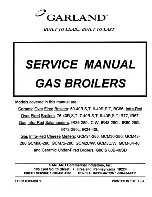
0020244997_07 Installation and maintenance instructions
51
Appendix
A
Inspection and maintenance work
The table below lists the manufacturer requirements with respect to minimum inspection and maintenance intervals. If na-
tional regulations and directives require shorter inspection and maintenance intervals, you should observe these instead of
the intervals listed. Each time inspection and maintenance work is carried out, carry out the required preparatory and com-
pletion work.
#
Maintenance work
Interval
1
Record all of the analysis results in the Benchmark Checklist in these
instructions
Annually
2
Ask the end user whether any significant problems occur when operating
the product
Annually
3
Use the diagnostics system to check the product's fault history
Annually
4
Visually inspect whether the air/flue pipe and its opening have been in-
stalled correctly in accordance with the set-up instructions
Annually
5
Check that the unit has been installed correctly and the connections have
been secured
Annually
6
Check that the condensate pipe is in good condition, that it is leak-tight
and that the drain is correct
Annually
7
Check whether all of the externally routed condensate pipes are dimen-
sioned correctly and have been insulated sufficiently (frost protection)
Annually
8
Check whether the gas flow rate corresponds with the specifications on
the data plate and lies within the tolerances specified in these instructions
Annually
9
If the gas flow rate lies outside of the tolerances specified in these in-
structions, eliminate the fault in accordance with the regulations and the
current technology
Annually
10
Check the general condition of the product and, if required, eliminate any
faults that are found
Annually
11
Carry out the combustion analysis: Measure the CO content, CO
₂
content
and the CO/CO
₂
ratio. For products with a rear air/flue connection: The
combustion analysis can only be carried out when the unit casing has
been removed; it is not necessary to test these products for flue gas recir-
culation
Annually
12
Check the product's recirculation at the supply air test point on the air/flue
pipe. If required, inspect the entire air/flue system and, if necessary, cor-
rect the fault
Annually
13
Disconnect the product from the electrical installation
Annually
14
Check and, if required, correct the electrical installation
Annually
15
Removing dirt from the product and the vacuum chamber
Annually
16
Visually check the heat cell to ascertain its condition and detect any cor-
rosion, rust or damage, and carry out maintenance work, if required
Annually
17
Check that the gas stopcock and service valves function correctly
Annually
18
Check the quality of the heating water: Clarity (clouding), correct inhibitor
and pH value
Annually
19
Removing the compact thermal module
at regular intervals
20
Check the burner for damage
at regular intervals
21
Checking the insulating mats in the combustion area and replacing dam-
aged insulating mats
at regular intervals
22
Cleaning the heat exchanger
at regular intervals
23
Cleaning the condensate trap
Annually
24
Filling the condensate trap
Annually
25
Installing the compact thermal module
at regular intervals
26
Checking the pre-charge pressure of the expansion vessel
at regular intervals
27
Cleaning the strainer in the cold water inlet
at regular intervals
28
Check the impeller sensor for dirt/damage
at regular intervals
29
If the water volume is insufficient (domestic hot water) or the outlet tem-
perature is insufficient, check the secondary heat exchanger
at regular intervals
30
Reassemble the product
After each time maintenance
work is carried out
31
Opening the service valves
Annually
















































